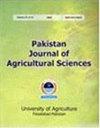Morphological, physiological, and biochemical response of citrus rootstocks to salt stress
IF 0.6
4区 农林科学
Q3 AGRICULTURE, MULTIDISCIPLINARY
引用次数: 0
Abstract
Soil salinity is one of the most significant stressors limiting plant productivity in the world's irrigated and cultivated agricultural lands. Plants have a wide range of adaptations and mitigation strategies to overcome salinity effects. It is possible to mitigate the effects of salt stress by the development of resistant cultivars and more efficient use of available resources. However, these methods are time-consuming and costly. Solutions to salinity issues need to be developed that are both straightforward and inexpensive, as they will likely only be implemented temporarily. In this study, the effects of the different salinity levels (Control, 20mM, 40mM, 60mM, 80mM, and 100mM) on citrus rootstocks were determined. In the citrus growing regions, the sour orange, trifoliate orange, and Carrizo citrange were the three most popular rootstocks. As a result of the present study, the sour orange was found to have the lowest decline in plant height (13.36%), leaf area (31.19%), and root length (8.13%), while the trifoliate orange had the lowest decrease in fresh weight of the plant (6.82%) and root (4.42%). Trifoliate orange was shown to have the highest levels of catalase activity, whereas superoxide dismutase and peroxidase activities were found to be highest in Carrizo citrange and sour orange, respectively. The highest concentration of plant nutrients was found in the Carrizo citrange. Therefore, sour orange was discovered to be more salinity tolerant in terms of morphological traits, physiological qualities, biochemical composition, and plant nutrition than trifoliate orange and Carrizo citrange. For areas with high salt levels, growing citrus on sour orange rootstock may be a viable alternative柑桔砧木对盐胁迫的形态、生理和生化反应
在世界灌溉和耕地中,土壤盐度是限制植物生产力的最重要的压力源之一。植物有广泛的适应和缓解策略来克服盐度的影响。通过培育抗性品种和更有效地利用可用资源,可以减轻盐胁迫的影响。然而,这些方法耗时且成本高昂。需要制定既简单又廉价的盐度问题解决方案,因为这些解决方案可能只是暂时实施的。在本研究中,测定了不同盐度水平(对照、20mM、40mM、60mM、80mM和100mM)对柑橘砧木的影响。在柑橘产区,酸橙、三叶橙和香橙是最受欢迎的三种砧木。本研究结果表明,酸橙的株高(13.36%)、叶面积(31.19%)和根长(8.13%)下降幅度最小,而三叶橙的植株鲜重(6.82%)和根重(4.42%)下降幅度最低,而超氧化物歧化酶和过氧化物酶活性在Carrizo citrange和酸橙中分别最高。香橙中的植物营养成分浓度最高。因此,酸橙在形态特征、生理品质、生化成分和植物营养方面比三叶橙和香橙更耐盐。对于高盐地区,在酸橙砧木上种植柑橘可能是一种可行的选择
本文章由计算机程序翻译,如有差异,请以英文原文为准。
求助全文
约1分钟内获得全文
求助全文
来源期刊

Pakistan Journal of Agricultural Sciences
AGRICULTURE, MULTIDISCIPLINARY-
CiteScore
1.80
自引率
25.00%
发文量
18
审稿时长
6-12 weeks
期刊介绍:
Pakistan Journal of Agricultural Sciences is published in English four times a year. The journal publishes original articles on all aspects of agriculture and allied fields.
 求助内容:
求助内容: 应助结果提醒方式:
应助结果提醒方式:


